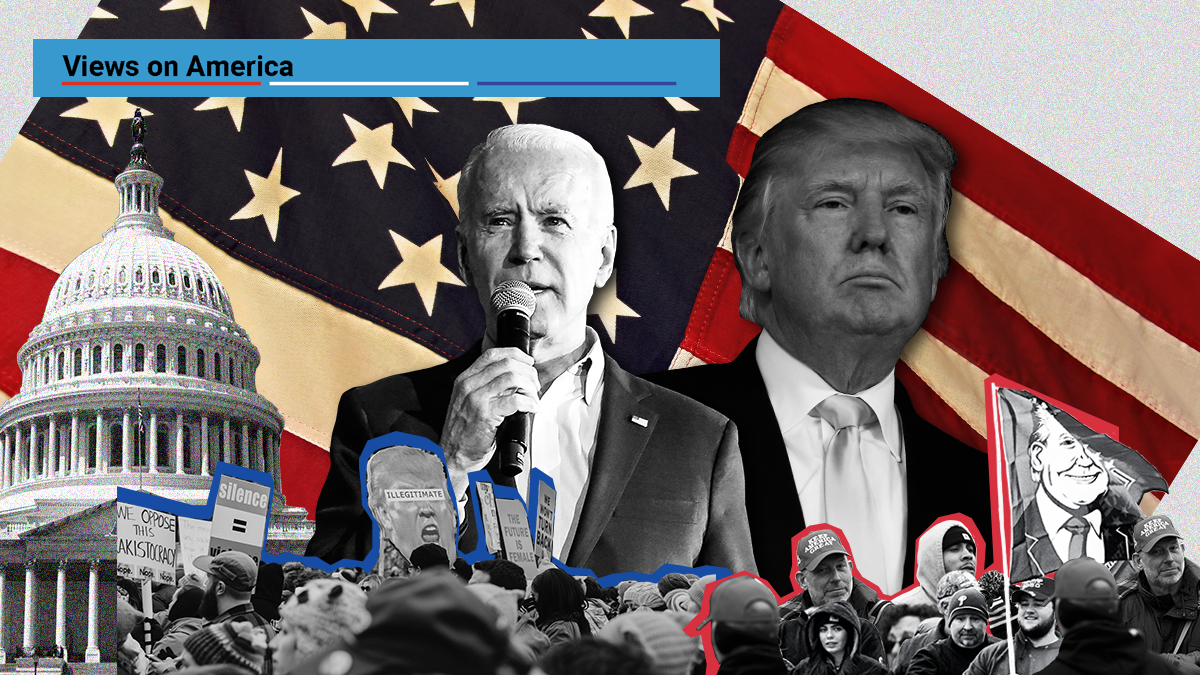A major question being asked from abroad this week is what recent global election results tell us about November’s US race. Will US politics get swept up by the anti-incumbent, anti-establishment sentiment seen elsewhere across 2024’s election cycle, eroding the longstanding US norm that current officeholders tend to be hard to displace? And what does this all mean for the particular contest between President Joe Biden and former President Donald Trump, jumpstarted by last week’s debate?
Already this year, incumbents in South Africa and India saw their majorities stricken, and Senegal’s elections brought an outsider to power. Still, Mexico’s election of Morena’s Claudia Sheinbaum pointed in a different direction. With this week’s elections in France, as well as the vote in the United Kingdom that’s almost certain to spell the end of Conservative Party rule, something fundamental appears to be shifting in incumbency politics with relevant signposts for November’s US election.
It seems clear that the emerging narrative from the current election cycle is a long-COVID story. Persistent inflation, higher-for-longer interest rates, cost-of-living pressures, and elevated unemployment rates are driving voting behavior. Global voters are finding their pocketbooks lighter than before the pandemic, regardless of what their politicians or treasury department statistics may tell them. In 2024, perception has become reality, and this spells peril for incumbents.
The post-pandemic reckoning around the economic recovery that is taking place this election season may be driving voters away from the center and toward the extremes. One headline from last month's EU Parliament elections was that the center held, and yet, viewed from another perspective, the rise of the right-wing cannot be overlooked. Call it pragmatism, tactical populism, whatever you like — further-right and further-left political parties and politicians are finding themselves inside governments from Italy to Argentina. These movements have now set their sights on France, the UK, and the US.
When UK Prime Minister Rishi Sunak called a snap election for July 4, it felt like an inauspicious date to have chosen for what is likely to be “independence” from 14 years of Tory party rule. That’s a stunning duration of time that masks a declining trajectory since 2021, with roots likely in 2016’s Brexit referendum. Sunak’s snap call has awoken Nigel Farage and the right-wing Reform UK party, which according to the latest polling, is a stone’s throw from overtaking the Tories for a second-place finish. This means that as Labour readies for a win, the most dominant political party for nearly a decade and a half faces an extinction-level political event.
While the party system in the US may be on a stronger footing than the UK this election cycle, parallels for the US election can still be drawn. It has long been said that US politics is polarized and that left-right fault lines are increasingly deep, allowing for fewer points of convergence.According to polling conducted 10 years ago, the share of Americans expressing consistently conservative or consistently liberal viewpoints doubled in two decades. The 2014 story was not only a polarization story, but also a partisan one. Ten years ago, people felt more conservative (or liberal) and more intensely identified as Republican (or Democrat) than in the past. Jumping forward to today, it is a near-truism that there is little common ground between the two political sides, and the gap is widening. According to the American National Election Studies’latest data, affective polarization has accelerated over the last decade. Today, only 21% of Democrats report positive feelings for Republicans, and only 18% of Republicans report positive feelings for their Democratic counterparts.
As a consequence of these trends, President Joe Biden has tried moving further to the left on certain issues to address the risk of “uncommitted” voters as well as younger and more progressive voting blocs. On the other side, former President Donald Trump, rather than seeking to appeal to more moderate voters, is sticking with messages about an (economic) “blood bath” that appeal to his base. In a sign of the times, polling in May found that “political extremism and threats to democracy” trails only the economy as the most important problem facing the country ahead of November’s elections. And in troubling news for Biden’s reelection camp, voters tend to trust Trump – at least on the economy – more than the president.
Politics may be cyclical. But cycles can be generational. With roughly half of the world’s population taking to the polls this year, who will be leading and what policies they set at home will have consequences beyond borders and for years to come. The post-pandemic reckoning taking place across India, South Africa, and Mexico is building momentum that hits Europe this week. By November, the US may find itself caught up in this global tide, driving disaffected voters from the familiar middle ground and toward the poles, bringing potentially bad news for today’s incumbents.
Lindsay Newman is the practice head of Global Macro, Geopolitics for Eurasia Group and is based in London. She writes the Views on America column for GZERO.
